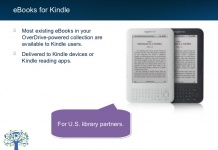Imagine—a 28-disc e-book read with a desktop-sized computer. That’s what OverDrive CEO Steve Potash, whom TeleRead profiled at length this month, recalls talking up to New York publishers in 1986.
A Library Journal account of a May 24 charity event held by the UJA-Federation of New York, honoring Potash, doesn’t mention what kind of book this was. A whole encyclopedia? A legal collection of some kind? Whatever the book, it’s no mystery why Potash would hold up a smartphone for the attendees and say: “I am so happy we are where we are today. I love this thing.”
During the ceremony, the first UJA Publishing Division dinner to honor an e-booker, Potash noted that his mother arrived in the U.S. alone as an orphan, a refugee, and received UJA-style assistance.
Today OverDrive, now owned by the Japanese conglomerate Rakuten although still run by Potash, is the largest distributor of library e-books. Rakuten, which also owns Kobo, the e-book-seller and e-reader device company, bought OverDrive for $410M.
Even if you’re not a publishing insider, I’d urge you to check out the YouTube above for an understanding of the relationships that drive publishing and the library side of the business. Potash has masterfully appealed to both the publishers and the libraries. I’m happy for his personal success and believe him when he talks about the social benefits of his business such as the encouragement of literacy.
At the same time, we need to think beyond the status quo and still work toward full-strength national digital library systems with librarians in charge—one way to look ahead to the time when Steve or like-minded members of his family may not be running OverDrive.
Libraries are institutions for the decades and, we hope, centuries. We mustn’t tie their fates to any one family or company.
That said, I’m all for the use of OverDrive and other companies as contractors, and meanwhile I’m looking forward to seamless integration of my Kobo reader with the OverDrive system.
Ironically, with public and academic national digital library systems and with a national digital library endowment helping libraries at all levels, OverDrive and other library-related companies might fare better than now.
We’re spending only around $4 per capita on e-books and other library materials. Beyond that, our libraries haven’t enough money in other areas, such as for publicity and other outreach—one reason why so many Americans don’t even know they can use their cell phones as e-book readers. OverDrive smartly set up a digital bookmobile to popularize e-reading. With more funding, so many other efforts like this could happen. Both librarians and private contractors could offer such services to popularize library e-books (which offer such vast potential for reaching under-read segments of the population, especially boys).
Not to mention the use of librarians to spread e-book literacy through cell phone book clubs and otherwise. Typical users aren’t getting nearly as much as they could out of e-books, whether the issue is navigation techniques or good ergonomics to reduce glare. What’s more, national digital library systems could encourage e-book-reader makes to offer hardware that was easier and and more comfortable to use. Mysteriously, Kobo rival Amazon adamantly refuses to offer all-text boldface on Kindles, despite the obvious benefits to certain e-reader users or prospective users with fading eyesight or learning disabilities.
For now, congrats to Steve and also to another UJA honoree, Penguin Random House’s Stuart Applebaum, communications director emeritus, about whom you can learn more in the video below.

































